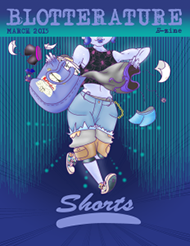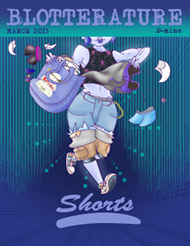Literary magazines are a great way for writers to get their work out there and noticed. Today’s post is an interview with Julie Demoff-Larson, senior editor of the lit mag Blotterature.
What is Blotterature?
JDL: Blotterature is a literary magazine started by a few friends that live in the Northwest Indiana corridor just south of Chicago. Blot has historically (all of two years) been an online journal that features poetry, fiction, creative nonfiction, and art. However, in 2015 we decided to move into print and are now publishing two print and four online issues per year. In addition, we have a volunteer staff of seven who write for Blot Lit Reviews—a thriving faction of Blotterature—for small press writers and publishing houses. Our main objective is to help build a strong literary arts community, not only in Northwest Indiana, but nationally.
What prompted you to start Blotterature?
JDL: Michelle L. Quinn and I are founding members of Blotterature; however, we did not generate the idea of starting a literary journal. A young friend approached us about editing and we took to the project. Unfortunately, she did not stay on board through the first issue, but we were hooked. It’s a commitment and a lot of hard work to keep the magazine going, so if you are in, you are all in. It began as this small thing with a slow pace that has snowballed over the last two years because of a lot of vision. Blotterature is constantly evolving as we implement our creative ideas.
What, in your opinion, are the pros and cons of publishing with a small press and a larger house?
JDL: This is a big question and I definitely hold some opinions about the subject. I will break it down and keep it simple for everyone.
Small Press Pros: a) There are so many to choose from and chances are if you have a great manuscript you will be able to find one to publish your work. b) An intimate relationship between the writer and editor. There is more one-on-one contact and most of the middle players are eliminated. It’s like you are the teacher’s pet all over again. C) You can learn a lot about the publishing process and your work
Small Press Cons: a) There are small press publishers who do not put out quality publications. How can you tell? Look at their listings. If the cover art looks like stock images, chances are they are not truly investing in their writers. Most times these publishers are not going through the editing process and the work is sometimes not up to par. Which brings me to b) Publishers that don’t go through the editing process with the writer to ensure the best possible manuscript. Might as well be self-publishing. c) Typically, there is no budget for book tours, marketing, and such. But hey, you can always ask Blotterature for a review.
Big Box Publishers Pros: a) They have money and lots of it. And with money comes publicity and promotional tours. It is all done for you. b) Distribution is done. You don’t have to sell to your neighbors and friends and the five copies you convinced Mom to buy. c) They will go through with a fine tooth comb to make sure each and every the, is, and but are correct.
Big Box Publishers Cons: a) It is really hard to get a deal with the biggies. First, you need an agent. And it is really hard to get an agent right off the bat unless you are paying some really big bucks. And even then it is not guaranteed. Really! b) It can take a long time to get your book on the market. Sometimes years. It is a much slower process than in the small press. Patience, my dear! c) You are just a commodity. A means to an end—profit. So, in order to be recognized your work must fit into the marketing demographic. You are writing for the masses here. There is no room for your creative meanderings—on the most part.
Any thoughts on self-publishing?
JDL: Don’t do it! Stay away from it! Well, at least for your first few publications. Let me tell you why. First, you need to establish credibility among your peers. Anyone can self-publish. It’s easy, right? But when you self-publish you bypass a major step of someone credible saying that your work is good enough to be published. It is hard for the public to take a writer seriously if the writer is the only one saying the work is good. And not to mention the serious editing skills you can learn by going through the process with a publisher. And second, why would anyone want to fork out the cost of self-publishing? Legit publishing houses cover all costs. Think about that for a minute. If you are marketing and travelling around to get your name and title out there, wouldn’t you want the cost of the actual book to be covered?
What is Blotterature currently looking for?
JDL: We are always looking for innovative work that tells a new story set in place with strong characters. Poetry that has strong imagery, political in nature, takes a stand, and changes our minds, views, ideals. Love the travelogue. Love the vernacular, diction, regionalism, blue-collar loveliness we hold dear to hearts. We are accepting for our print issues continuously, and also for the dual online/print issue AD INFINITUM, which addresses the themes and elements of identity, memory, lies, the advertising ‘sell’; again and again in the same way; forever. And don’t forget we are always looking for novels, collections, journals, and anthologies to review.
What is Blotterature NOT looking for?
JDL: Anything that creates stereotypes or perpetuates hate in any way. We don’t want to read about rape or pedophilia… no matter how vague they try to make it through metaphor. Just no.
As an editor/publisher of a literary magazine, what common mistakes do you see in submissions that would prompt a rejection?
JDL: Blotterature has established a blind submission in which we don’t allow for any identifying information in the body of the work or the file name. We did this to make it an even playing field for all. This has ensured that we as editors are not biased towards our friends in the writing community. And the best part of a blind submission is the surprise when we find out who the writer is—male/female, young/mature, widely published/first publication, or straight/gay. Running on a blind seems to free us from any preconceived notions of what the meaning must be, and instead we are establishing meaning based on our own experience and connection to the piece. So to say it plain, if there is any identifying information we automatically reject.
What advice would you give to a writer regarding publishing options (whether it is long or short form or poetry)?
JDL: If you are just starting out on the publication circuit it is a good idea to get your work into journals. Establish your credits for your dear bio. Also, a good way to get your name recognized in the small press is working in the lit community. I recommend review writing, reading/editorial staff for a journal, start a reading series, host a panel at a writing conference, go to readings and meet friends…writer friends. Your name will be noticed and they just might consider putting you in their publication.
But the biggest advice I can give is to stay true to your art, find your voice, and have a small group of critics you trust. It is important to be able to make changes to your work, to edit, to recognize good advice, but you must have integrity and be able to say no when you don’t agree. Keep working and I hope to see some damn good work out there!
 A little side note: Blotterature and Lit Press Fest are hosting the first ever “Small Prestivus” on August 1-2 in Griffith, Indiana. This small press fest will feature a book fair, readings, writing workshops, art demos, singer/songwriters, and an all-day Festival of Language that will begin with a publishing Q/A. More details at blotterature.com/events
A little side note: Blotterature and Lit Press Fest are hosting the first ever “Small Prestivus” on August 1-2 in Griffith, Indiana. This small press fest will feature a book fair, readings, writing workshops, art demos, singer/songwriters, and an all-day Festival of Language that will begin with a publishing Q/A. More details at blotterature.com/events
For Submission information please visit blotterature.com/submissions
Like us on Facebook and on Twitter at @blotterature
Julie Demoff-Larson is head fiction editor, managing editor, and co-queen bee at Blotterature Literary Magazine. She has a B.A. in English Literature from Purdue University and her dedication to the writing community is second only to family and friends. Her short stories are published in Mangrove, Ricochet, Epiphany Magazine and in Good Morning, Justice, an anthology from Brine Books Publishing. She is especially interested in fresh, innovative stories that break the mundane and if you read back issues you will see that she loves regional dialect. She plans on opening an independent bookstore in Northwest Indiana in early 2016.



Leave a comment